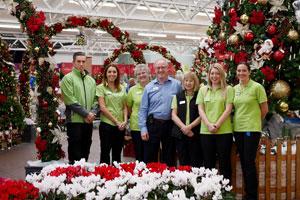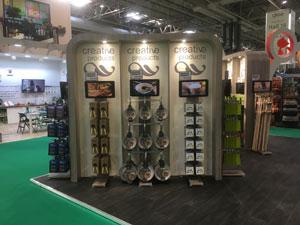Trading since the 19th Century is no mean feat: from two acres and a florist’s shop to a network of 12 garden centre, Hillier has survived two world wars, 10 recessions and the brand is now preparing for Brexit. Chris Francis, garden centre director at Hillier, talks to us about his role in the company and how the brand is going forward in 2018…
The history of Hillier
Hillier has an amazing family history spanning more than 150 years. It was founded by Edwin Hillier in 1864, starting with a two-acre nursery plus companion’s florist shop in Winchester.
It is still a family business to this day, with the fifth generation now actively involved, but is has also grown to become a prosperous business that encompasses amenity trees plus cash & carry divisions, our wholesale nurseries and a network of 12 garden centres across the south of England.
I joined Hillier in March 2014. Having been in the garden centre business for many years, I had always admired Hillier as a fabulous brand. I had a number of discussions with the chairman Robert Hillier, as he saw an essential need to update and modernise the garden centre side of business. I was fortunate to be given that opportunity, to join and transform that side of the business.
In every part of Hillier business, the aim is to inspire those we work with. Our company mission – to inspire the creation of green living spaces for now and the future – sets that out clearly.
Hillier is known for more than 150 years of plant expertise and we certainly want to remain the UK’s leading horticultural expert. Quality is a fundamental part of everything we do – we want to be first choice for top quality trees and plants and a pioneer of the industry.
As a company, it is also important we are commercially successful and reinvest for the future of the company. We do so while upholding our family values and supporting the growth of our people.
Hillier is traditionally known as the destination for plant lovers, but our garden centre customers include anyone looking to make the most of their home and outdoor space, from novice to expert gardeners.
Hillier product range and customer offering
Changes to our range all come back to our two major watchwords: quality and value. It’s about the right products at the right price – and not about being expensive. This applies consistently across all categories.
Since I joined Hillier, we have removed the traditional A-Z plant range and introduced a wide range of Hillier branded plants grown on our own nurseries in Hampshire. This means our garden centres now offer a top-quality range of plants that are in keeping with the Hillier brand and reputation.
Outside of plants, the outdoor category has been one of the biggest success stories of the last few years, with an improvement in the quality and breadth of our range. Demand has grown so much that we have needed to put in a central furniture warehouse in Newbury.
Hillier is known for its plant experts and will always continue to be, but other parts of our garden centre business are also growing in significance and we have put emphasis on improving the quality of our offer in these areas too.

Not just a plant retailer
We have put a real focus on our restaurants in the last couple of years, taking all garden centre restaurants under our control. Our garden centre restaurants are a key part of our business model and a real emphasis on transforming this side of the business in the last couple of years. We recognise that our restaurants are a destination in themselves, giving our customers another reason to visit and spend time with us.
One of the first steps in our transformation has been taking on a Head of Restaurants and Development Chef in early 2016, plus recruiting top calibre restaurant managers at each centre.
We have invested significantly into the look and feel of our restaurants, including a complete interior redesign at Newbury.
The emphasis with our food offering is ‘freshness’. We have seasonal menu changes and have increased the amount of ‘homemade’ products we offer.
The proof, as they say, is in the pudding. In two years, our restaurant business has grown 45%, including 20% growth in average spend.
Our concession partners continue to be important and we have added a number of complementary concessions. At our Eastbourne centre, for example, we completed a major expansion project in September 2017 that included five new concession partners.
Experiences are extremely important for retail at the moment and we have reinvigorated and expanded our annual events calendar. Alongside classes for the novice to expert gardener we also offer fun, hands-on seasonal workshops, like our wreath-making sessions at Christmas and have introduced cooking classes led by our Development Chef.
Online is absolutely a key part of the business. We don’t currently sell online, as it’s essential the logistics behind this is spot on before we do. But our website is one of the key ways we share information with customers old and new about our offers and what’s on as well as a place to provide inspiration and share gardening expertise.
Quality and value for money are always our top priorities when sourcing new products. We look for something that is different, but it needs to be a genuinely useful innovation and not just a gimmick.
Who we work with is also critical. We look to create partnerships with companies who have a similar ethos to us, so we can work together towards a common goal.
Despite diversification into different category areas, nursery stock remains our most important category for volume sales.
Over the next 12 months, I am excited that we will introduce a range of bigger plants for instant impact, including trees sourced from our own Hillier Trees nursery. We are the UK’s biggest grower of trees. Bringing that range to the retail market, having mainly just offered it to trade customers historically, is a very exciting opportunity.
Brexit and biosecurity
The two biggest topics that are going to keep affecting garden centre business in the future are Brexit and biosecurity. My view is that these both connect to the importance of growing locally. It’s very likely, for example, that our use of imported plants from Mediterranean countries will reduce as biosecurity threats continue to rise.
For Hillier, our focus is going to be on our home-grown stock. I have a goal for both our nursery and garden centre team that, ultimately, all our plant stock should be home-grown. This is not an overnight job, but it represents a huge opportunity right now for the UK industry.
For more information on Hillier, see hillier.co.uk.



